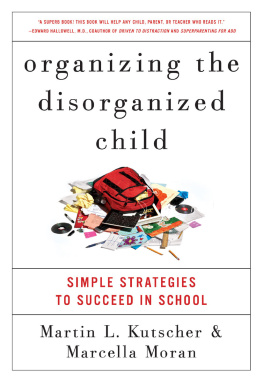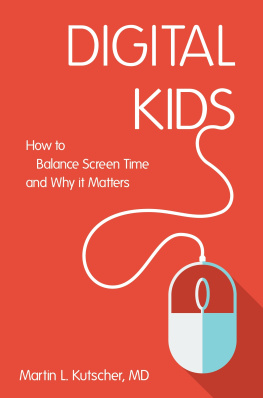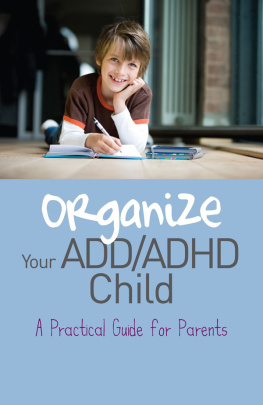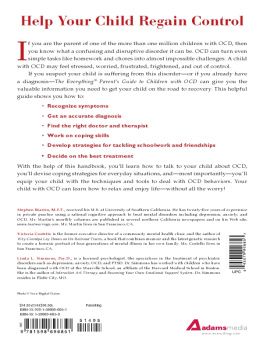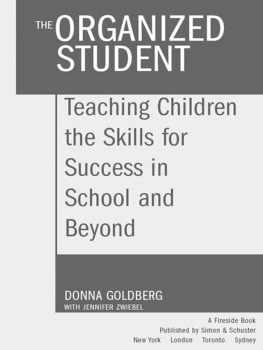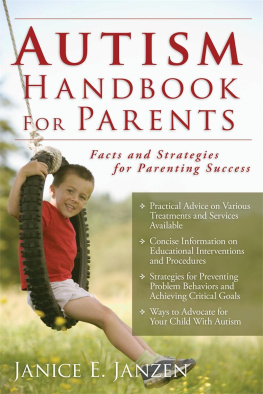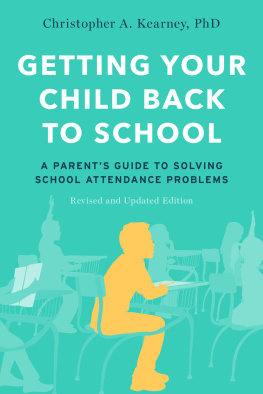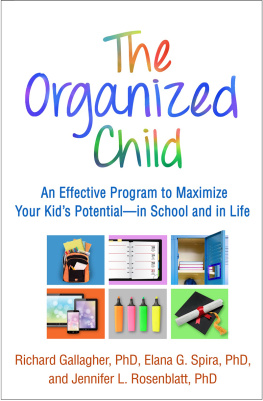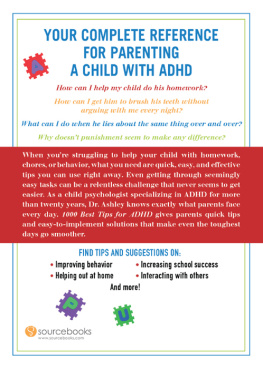Martin L. Kutscher, M.D.
and
Marcella Moran, M.A., L.M.H.C.
who have taught me so much .
for their patience and support .
Contents
How Did My Child Get So Disorganized? (And How Do I Start Fixing It?)
What Is My Childs Organizational Style?
Choosing and Setting Up the Supplies
Follow the Paper Trail: Getting Work Home, Doing It, and Returning It
Super Study Skills
The Morning and Nighttime Routines
Could It Be Something Else?
Further Resources
Does he use his assignment book? Are you kidding!?!? He doesnt even know where it is. He never plans ahead. Were always going back to school to get the right books. At home, I have to stay with him or nothing gets accomplished. And thenafter we fight for hours to get the homework donehe forgets to hand it in the next morning! Our whole family is at wits end. When will the fighting stop?
We, too, are parents of children who struggle with organizational skills. Weve heard the reports that the kids are bright but need to apply themselves. Weve been up late at night, glue-sticking that poster project that was assigned two weeks ago but that we just found out about. Weve experienced the frustration, anger, and hopeless feelings that can arise when dealing with a disorganized child. Weve been through all of the fighting.
In our professions as a pediatric neurologist (Martin) and a therapist/coach (Marcella), we have used these experiences to guide our work with children who have problems with organization, homework, and study skills. Most of their parents are completely stressed out by the time they make it to us. Many families have turned to the school or therapists for help. As weve discovered, though, the school and the therapists often dont have the skills, the know-how, or the time to solve the problems. Organizing the Disorganized Child shows parents how to take the reins and teach organizational and study skills to their children. It puts the situation back in control.
This book finally will answer the parents question How can I help my child get organized without it being a fight? Other books offer some strategies, take into account the learning style of the child, and even give resources as to where you can buy clear plastic boxes to store junk. But this book is the essential organizational guide that factors organizational styles into the equation and offers effective strategies that deliver amazing long-term results. We will show not only parents but also teachers, schools, counselors, coaches, and therapists a simple set of personalized organizing and study skills to teach to children so that they can experience all the success they deserve.
A common pitfall of many approaches is the belief that we simply need to show kids how to be organized. Look! Mom says. I showed him a few times how to use a planner. Hes fixed now. Phew! If it were quite that easy, wed be done in an hour. Were not going to fall into that trap. Late elementary and middle school kids likely already know how to use a plannerits not that tough to learn. If you were to give them a true/false quiz on using an agenda book, theyd probably get a 100 percent. Try it. Ask your child a few questions: You should write down all of your assignments: true or false? You should check assignments off when they are completed: true or false? See! They already know what to do. What they cant do is actually do it. Thats because some people have a problem actually carrying out (executing) their intentions.
Thus, teaching children with organizational difficulties what to do is often useless unless you can ensure that theres an organizational system in place to oversee the execution of those skills. The parents and teachers need to know more than just how to teach a child the appropriate organizational techniques. They must also be taught how to provide ongoing supervision of these skills at the moment that help is actually needednot punishment after the child has already underperformed. So Organizing the Disorganized Child explains both how to teach and how to supervise organizational skills.
Making sure students are organized enough to know what they are supposed to do is a great, necessary start. However, they still need to read, take notes, and study the material. Some students effortlessly learn these skills. However, many just dont have a clue. This book will help caregivers teach these learning skills to all of those students who havent absorbed the techniques through osmosis.
So, what is the step-by-step game plan? Chapter 1 explains the roots of our childrens organizational problems and the parents role in fixing them. Chapter 2 explains the different organizational styles used by different students. Not all kids organize the same way! Well build upon these insights in the rest of the book. In chapter 3, well discuss what materials to buy and how to set up the study area. Chapter 4 lays out a step-by-step plan for an organizational system. Well follow the paper trail: getting the correct work home, planning the work, and getting it back to where it belongs. Chapter 5 explains to parents how to teach their children reading, note-taking, study, and test-taking skills. Chapter 6 will address organizing the morning and nighttime routines. In the appendices, well address some of the conditions that might be causing the organizational problems, such as ADHD or learning disabilities, and give suggestions for further readings.
Some techniques will result in rapid change. Even just a few pointers can deliver meaningful results. One key, for example, is to make the material more meaningful by teaching the student to constantly ask him/herself questions about what is being read, written, or studied. This key technique of asking questions often results in a deeper and clearer understanding of the material. However, not all brains are preprogrammed for good organizational and study skills. We cant completely fix everything overnight. We can, though, expect continued progress over a mountainous terrain toward an ultimately successful future. The fighting will stop!
Lets get started!
How Did My Child Get So Disorganized?
(And How Do I Start Fixing It?)
I dont really blame Judys teachers for thinking that she doesnt care about school. If I didnt love her so much, I wouldnt believe that she cared, either. But I know that she is such a good kid! Shes aware that she has to do the work. Yet she keeps sabotaging herself. She comes home and invariably is missing some of her assignmentsand doesnt even know it. Then we spend hours fighting to get it done. (It would be so much faster if I could just do it for her. Frankly, I just did a great job on her poster project! We got an A!) We finally get homework done, and then she cant find it in the morning when her teacher asks for it! The teacher thinks that shes lazy, but I know that if she were really lazy, she wouldnt have done it in the first place. After all, once shes done it, she may as well hand it in for the credit. How can she be so smart at coming up with ideas for her paper and so, welldumb when it comes to handing it in? I just dont get it!
Fortunately, I came across this great idea: We now have a separate folder for all homework to be handed in. When any teacher asks for the homework, theres only one place she has to lookin that folder. And I know its there, because I double-checked it last night. Simple solution. Problem solved. On to the next issue.

